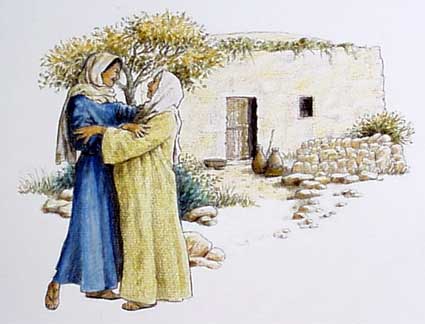Matthew 1:18-25 NKJV
"18 Now the birth of Jesus Christ was as
follows: After His mother Mary was betrothed to Joseph, before they came
together, she was found with child of the Holy Spirit. 19 Then Joseph her
husband, being a just man, and not wanting to make her a public example, was
minded to put her away secretly. 20 But while he thought about these things,
behold, an angel of the Lord appeared to him in a dream, saying, "Joseph,
son of David, do not be afraid to take to you Mary your wife, for that which is
conceived in her is of the Holy Spirit. 21 "And she will bring forth a
Son, and you shall call His name JESUS, for He will save His people from their
sins." 22 So all this was done that it might be fulfilled which was spoken
by the Lord through the prophet, saying: 23 "Behold, the virgin shall be
with child, and bear a Son, and they shall call His name Immanuel," which
is translated, "God with us." 24 Then Joseph, being aroused from
sleep, did as the angel of the Lord commanded him and took to him his wife, 25
and did not know her till she had brought forth her firstborn Son. And he
called His name JESUS."
A Little Background
The marriage customs of Biblical times included a period of time known as the betrothal.
This is somewhat similar to what we call an engagement period in that it
is the time before a marriage when a man and woman commit to marry one
another. But in Biblical times, the
betrothal was much more serious. The
parents would come together with the couple and a formal agreement would be made. It was as serious as marriage itself except
that the couple would not yet have sexual union at that time. It was often seen as a marriage and the
couple as husband and wife. If the woman
was unfaithful during the betrothal period, the man could divorce her.
Some Explanation
Mary was betrothed to Joseph. She was still a virgin. It’s important to note here that liberal theology
denies the virgin birth of Jesus Christ.
The context of the passage is clear.
Joseph learned that Mary was pregnant and was ready to divorce her. Mary herself declared to the angel that she
was a virgin and questioned what would happen since she had no sexual union
with a man.
The virgin birth is a foundational doctrine for the
believer. First of all, it was
prophesied as a sign of the Messiah in Isaiah 7:14. Jesus was Immanuel, God with us, God in
flesh, God the Son. Only a perfect
sinless sacrifice could atone for sin or appease God’s wrath. God the Holy Spirit overshadowed Mary and she
conceived Jesus. He would be fully God
and fully man and the only one who could pay for the sin of mankind. If Jesus were not born of a virgin, He would
have been fully man, and thus born in Adam’s sin; therefore, He could not make
the perfect sacrifice required to atone for sin. (More on this topic here.)
Having considered his options, Joseph decided to divorce
Mary privately. Then in a dream an angel
appeared to him and told him that Mary’s child was conceived by the Holy Spirit,
and that he should continue the marriage.
We often focus our attention on Mary when we consider the birth of Jesus—and
rightly so. But we sometimes miss the
courage and faithfulness of Joseph. He believed
and then acted on that belief. He immediately
married Mary, and respected her and her unborn child by withholding sexual
relations with her.
Observations and Insights
Verse 19 describes Joseph as being a “just” or righteous
man. Luke 1:6 also described Elizabeth
and Zacharias as being righteous. Again,
like them, Joseph was not sinless (Romans 3:10, 23). However, the righteousness described here was
of the law. Joseph was careful to obey
the law, making the required sacrifices.
Adultery is a sin. Joseph was
righteous to “put Mary away” or divorce her for her perceived adultery. But Joseph was also gracious and compassionate. He did not want to make a public spectacle of
her, but would divorce her privately.
As a believer living in a fallen world, I am faced with my
own temptations to sin. Yet, I am often
quick to judge others who do so, rather than extending grace toward them. God is holy and righteous, yet He is also
just and full of mercy. He is
longsuffering unto salvation (2 Peter 3:9-15).
Christians are correct to stand for righteousness. We must never take sin lightly, but we must
also be compassionate toward others. It
is by the grace of God that He delivered me from the kingdom of darkness and
placed me into the kingdom of His Son.
Later, as we read the interactions between Jesus and the
Pharisees, it is exactly this kind of attitude that Jesus took. He never dismissed sin, but confronted it and
forgave it. That is why He could be a
friend to tax collectors and sinners.
That is why He could extend His grace to you and me.
" And a servant of the Lord must not quarrel but be gentle to all, able to teach, patient, in humility correcting those who are in opposition, if God perhaps will grant them repentance, so that they may know the truth, and that they may come to their senses and escape the snare of the devil, having been taken captive by him to do his will." 2 Timothy 2: 24-26 NKJVNext: Luke 2:1-20






